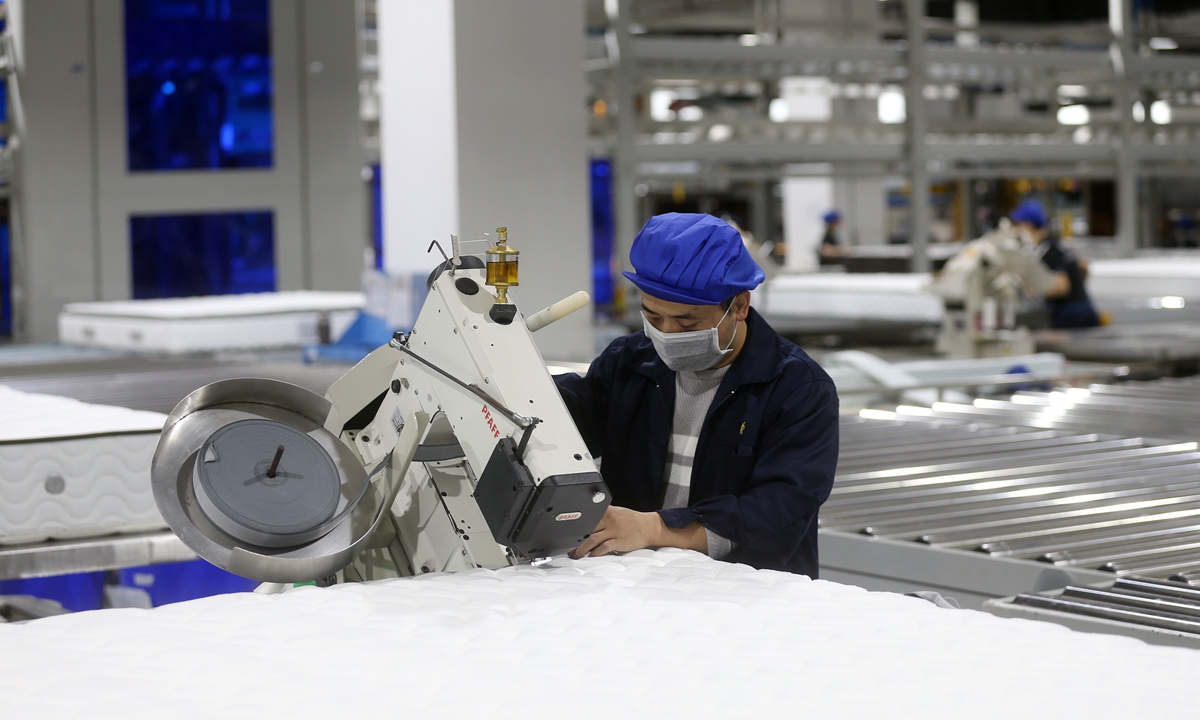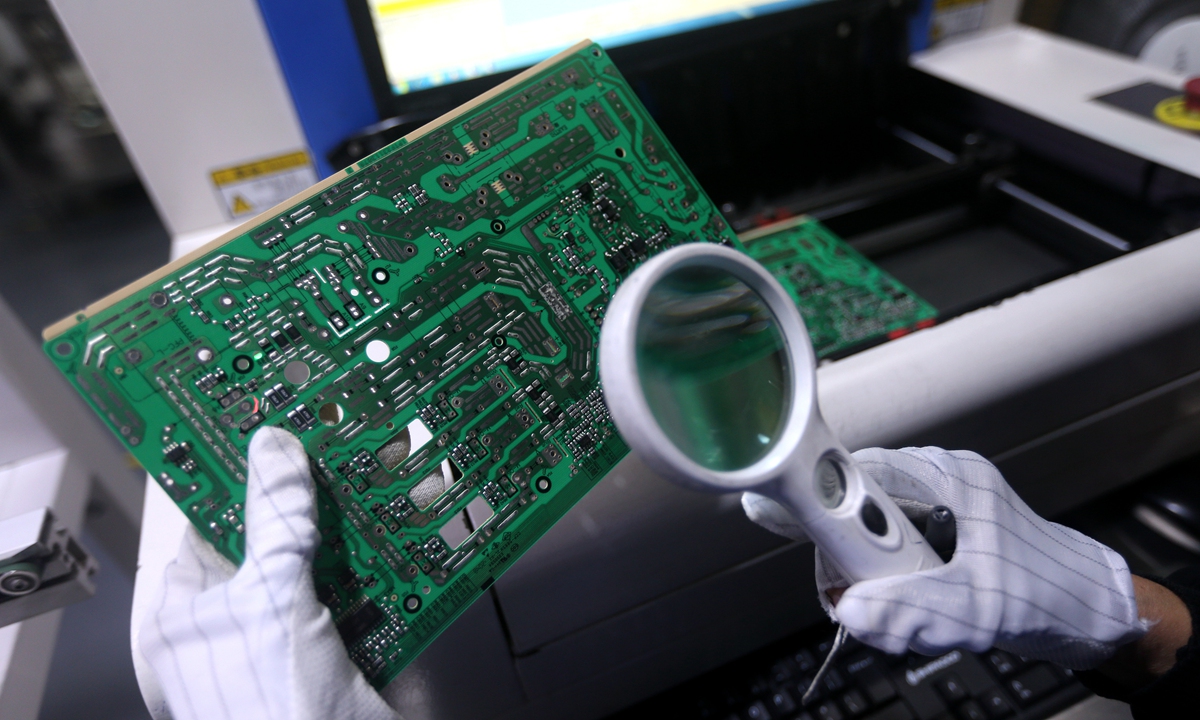Chinese products rock the world amid global lockdowns as home appliance orders jump up to 100%
By GT staff reporters in Dongguan, Yiwu and Shenzhen Source: Global Times Published: 2020/12/20 16:23:39

An employee works on a mattress production line of De Rucci Healthy Sleep Co in Dongguan, South China's Guangdong Province on December 14. Photos: Cui Meng/GT
Fighting back against the coronavirus pandemic that severely disrupted businesses activities, Chinese products are rocking the world. Both the wholesalers at the world's "supermarket" Yiwu, East China's Zhejiang Province, and the producers of South China's Guangdong Province, where many manufacturing factories are located, have been busy responding to an unprecedented boom in international orders which came at a magnitude that many of them have never seen before.
The surging demand focuses on home appliances and outdoor commodities, including goods ranging from textiles and electric appliances, to scooters and bikes, as people adopt more independent activities amid the pandemic.
Surging demand
Manufacturers from Guangdong, one of the world's leading factory zones, told the Global Times that 3D printers and bed linen are seeing an unexpected eruption in demand as millions are confined to their homes during lockdowns in multiple major economies.
"Because of the pandemic, people are staying 1.5-2 hours longer in bedrooms compared with the pre-pandemic levels," said Liu Fengzhen, an executive at De Rucci Healthy Sleep Co,a mattress maker based in Dongguan, a manufacturing center in Guangdong,
As they stay inside bedrooms longer, they are buying more home textiles and bed linen to improve their quality of living, Liu said, noting that the company is eyeing double-digit increases in sales for the whole year even as first quarter sales tanked.
Since rebounding to positive territory in April, China's exports grew 8.3 percent during the first 11 months,according to data from China's General Administration of Customs (GAC).
Products under the stay-at-home economy category, including consumer electronics and home appliances, have pulled up China's total exports by 1.1 percentage points during the first three quarters.
Exports of furniture and accessories grew 11.2 percent in the first 11 months, says data from the GAC. November exports totaled 46.14 billion yuan, an increase of 19.3 percent from that of October, according to Dongguan official data.
Xu Changxuan, general manager of Ruixinte Electronic that manufactures LED screen parts and circuit boards in Dongguan, told the Global Times that the order of parts for home electronic devices, such as screens and microwave ovens, increased during the pandemic.
"Since July, our orders have witnessed an apparent increase, predominantly parts for LED screens... I believe that customers' increased time at home is a key driver for the order increase," said Xu, whose company indirectly supplies parts for big TV makers including Chinese brand Changhong.
As consumers around the world spend more time at home, the demand for musical instruments also picked up, said Zhong Wenhui, general manager with Huizhou Densun Musical Instrument Co Ltd, a manufacturer of guitars and accessories in Huizhou.
The US is the world's leading consumer of musical instruments, accounting for nearly 70 percent of global demand. Nearly 35 percent of the world's guitars are supplied from the Qiuchang township where Zhong's company is based.
This year, due to the pandemic and subsequent lockdowns, retail stores in Western countries are not placing many orders, but this gap is being filled by a surge in e-commerce, as orders from Amazon vendors continue to flow.
"We are seeing a 20-30 percent increase in orders from stores on Amazon," Zhong said, noting that even amid an acute shortage of containers and a 400 percent surge in freight cost, this has not prevented them from sending containers to the US at a rate of one each month.
"Demand for accessories, such as guitar strings, is especially strong, I can tell you people in Western countries are spending more time playing guitar," Zhong said.
Among the destination markets, India is one of those that has seen booming orders for corresponding products as the country is short of small commodities this year, because of the production disruption posed by the epidemic.

An employee checks a circuit board in the factory of Ruixinte Electronic in Dongguan, South China's Guangdong Province on December 14. Photos: Cui Meng/GT
From January to October, the import and export value of Yiwu reached 258.08 billion yuan, up by 5.8 percent year-on-year. Among them, exports reached 248.36 billion yuan, up 5.1 percent, and imports reached 9.72 billion yuan, up 27.5 percent, in which India has jumped to second place after the US at the top, according to the latest data by Yiwu Customs.
"Household items such as lamps, mosquito swatters, juicers and kettles all shows strong demand as people in pandemic-hit countries are staying at home longer," Luo Hongying, president of Hongying Electric Appliance, told the Global Times, noting that although foreign clients can't come to her stores in Yiwu because of the pandemic, many of them managed to seize the moment and increased their orders.
"The quantity of orders placed on our side from countries such as India has increased with foreign clients purchasing 20,000 for stock preparation instead of 10,000 before the outbreak," added Luo, noting that with the concerns of the potential disruption from the outbreak next year, some are ordering more to replenish their stock.
Seizing opportunities
The soaring orders have brought rising business opportunities. Winning Star Electronic Technology company in Yiwu began to produce home appliances the year before last, but as small appliances, such as juicers and thermos kettles, are doing particularly well, their sales are also up by 170 percent this year.
A manager with Winning Star Electronic Technology company, surnamed Huang, told the Global Times that with China's successful containment of the pandemic, their factories in Guangdong were able to resume production, which enables them to accelerate production as orders from abroad are picking up.
Like many other Yiwu suppliers, although they are expecting very few foreign clients to visit their stores this year, this has not been a hurdle to their business, but rather a drive for change from offline to online.
"We all had Facebook accounts but never have we used them as often as now under the need for distant communications," said Huang, noting that before the outbreak, there were up to 20 clients coming to the stores per day, and now they are sitting in front of computers to serve more clients online.
In order to reach out to broader consuming groups online, she is learning French to cater to African countries. Through simple words, item display and even gestures, some vendors are able to seize the deals.
In order to better help local businesses in the transition to online, Yiwu International Trade City, a sprawling shopping center, has launched Chinagoods.com for all merchants, targeting international customers.
"As a comprehensive service platform, it offers merchants a one-stop cross-border logistics service, as well as online exhibition and market information," a manager with the center told the Global Times, noting that since it was officially launched in mid-October, almost every merchant - around 80,000 local suppliers - has joined the platform.
Longer time spent at home also drove up the demand for toys, as students in many countries have to attend online courses at home, John Ng, factory manager at an auto models producer Maisto, told the Global Times, adding that the company's export value increased from about 117 million yuan ($17.9 million) in 2019 to 200 million yuan this year, an 18 percent jump.
Based on the company's incomplete statistics, sales this year in the US market have seen a more than 10 percent increase year-on-year, said Wu, whose company has clients from 146 countries across the world.
In addition to home appliances, global consumers are embracing individual transport amid the outbreak, a move immediately spotted by factory owners in Shenzhen.
After May, the demand for electric scooters in the UK, Italy, France and Spain increased 8-10 times compared with the same period last year, Michael Qi Yong, general manager at consumer electronics distributer Shenzhen Muchen Technology Co, said.
"Europe boasts a developed transportation system, but after the coronavirus outbreak, many people gave up public transport in order to keep social distancing. Some would adopt electric scooters to go to work if the journey is not too long," Qi noted, adding that such demand is more obvious in Europe than that in the US.
Chen Guosen, a manager of UTS Sports, a sport goods supplier that produces skid boards and helmets in Guang Zhou, South China's Guangdong Province, has had similar experiences as their skid board orders almost doubled this year compared with last year, while helmets also saw a nearly 60 percent increase year-on-year.
"In the beginning of the outbreak, our production was halted by our overseas clients, as the pandemic caused uncertainties at home, however, since late March, orders started to pick up, and July, August and September became the busiest period of the year, "said Chen, whose orders mainly come from the US, EU and parts of South America.
A surge in shipments of commodities such as electronics, textiles and automotive products has fueled an uptick in global trade in recent months, the WTO reported on December 4.
As business and production in China are growing at a faster pace, global trade is also recovering from a deep slump in the second quarter as major economies began to lift some lockdown measures in fall season, according to a report by the WTO.
Newspaper headline: Booming stay-at-home economy
Posted in: ECONOMY